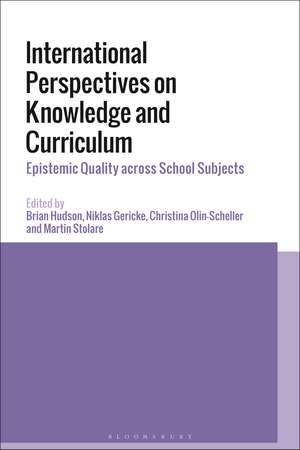International Perspectives on Knowledge and Curriculum: Epistemic Quality across School Subjects
Editat de Professor Brian Hudson, Professor Niklas Gericke, Professor Christina Olin-Scheller, Professor Martin Stolareen Limba Engleză Paperback – 23 aug 2023
| Toate formatele și edițiile | Preț | Express |
|---|---|---|
| Paperback (1) | 191.75 lei 6-8 săpt. | |
| Bloomsbury Publishing – 23 aug 2023 | 191.75 lei 6-8 săpt. | |
| Hardback (1) | 569.37 lei 6-8 săpt. | |
| Bloomsbury Publishing – 23 feb 2022 | 569.37 lei 6-8 săpt. |
Preț: 191.75 lei
Preț vechi: 249.57 lei
-23% Nou
Puncte Express: 288
Preț estimativ în valută:
36.70€ • 39.85$ • 30.82£
36.70€ • 39.85$ • 30.82£
Carte tipărită la comandă
Livrare economică 22 aprilie-06 mai
Preluare comenzi: 021 569.72.76
Specificații
ISBN-13: 9781350225084
ISBN-10: 1350225088
Pagini: 256
Ilustrații: 30 bw illus
Dimensiuni: 156 x 234 x 25 mm
Greutate: 0.36 kg
Editura: Bloomsbury Publishing
Colecția Bloomsbury Academic
Locul publicării:London, United Kingdom
ISBN-10: 1350225088
Pagini: 256
Ilustrații: 30 bw illus
Dimensiuni: 156 x 234 x 25 mm
Greutate: 0.36 kg
Editura: Bloomsbury Publishing
Colecția Bloomsbury Academic
Locul publicării:London, United Kingdom
Caracteristici
Provides a valuable source for reflection on the design, implementation and outcomes of research studies in the field of educational sciences and subject didactics
Notă biografică
Brian Hudson is Emeritus Professor of Education at the University of Sussex, UK, and Guest Professor in the Department of Educational Studies at Karlstad University, Sweden. He is a Fellow of the Institute of Mathematics and its Applications, Honorary Member of EERA Network 27 Didactics - Learning and Teaching, and was awarded a National Teaching Fellowship in 2004. Niklas Gericke is Professor in Science Education at Karlstad University, Sweden, where he is Director of the Science, Mathematics and Engineering Education Research (SMEER) Research Centre. He is also Guest Professor at Norwegian University of Science and Technology (NTNU), Norway. Christina Olin-Scheller is Professor in Educational Work at Karlstad University, Sweden, where she is Director of Centre of Language and Literature in Education (CSL) Research Centre and Co-Director of the Research on Subject-Specific Education (ROSE) Research Group. She coordinates the Swedish National Literacy Network and participates in the Nordic QUINT (Quality in Nordic Teaching) Research Centre. Martin Stolare is Professor in History at Karlstad University, Sweden, where he is Co-Director of the ROSE (Research on Subject-Specific Education) Research Group and Senior Researcher at CSD (Centre for Social Science Education).
Cuprins
List of IllustrationsList of ContributorsPrefaceForewordAcknowledgements Foreword, David Lambert (University College London, UK) 1. Researching Powerful Knowledge and Epistemic Quality across School Subjects, Niklas Gericke, Brian Hudson, Christina Olin-Scheller and Martin Stolare (Karlstad University, Sweden) 2. Evaluating Epistemic Quality in Primary School Mathematics in Scotland, Brian Hudson (Karlstad University, Sweden, and University of Sussex, UK) 3. Epistemic Quality of Physical Education in a High School in France, Monique Loquet (Rennes 2 University, France), Brian Hudson (Karlstad University, Sweden, and University of Sussex, UK) and Anke Wegner (University of Trier, Germany) 4. Epistemic Quality of Language Learning in a Primary Classroom in Germany, Anke Wegner (University of Trier, Germany), Brian Hudson (Karlstad University, Sweden, and University of Sussex, UK) and Monique Loquet (Rennes 2 University, France) 5. Powerful Knowledge of Language and Migration in Norwegian and Swedish Textbooks, Birgitta Ljung Egeland (Karlstad University, Sweden) and Lise Iversen Kulbrandstad (Inland Norway University of Applied Sciences, Norway) 6. Powerful Reading and Epistemic Quality in First Language and Literature Education, Satu Grünthal, Pirjo Hiidenmaa and Liisa Tainio (University of Helsinki, Finland) 7. Teaching Practices in Transformation in Connected Social Science Swedish Classrooms, Marie Nilsberth, Christina Olin-Scheller and Martin Kristiansson (Karlstad University, Sweden) 8. Epistemic Quality in the Intended Mathematics Curriculum and Implications for Policy, Jennie Golding (UCL Institute of Education, University College London, UK) 9. A Material-Dialogic Perspective on Powerful Knowledge and Matter within a Science Classroom, Mark Hardman (UCL Institute of Education, University College London, UK), John-Paul Riordan (University of Canterbury, UK) and Lindsay Hetherington (University of Exeter, UK) 10. Investigating the Nature of Powerful Knowledge and Epistemic Quality in Education for Sustainable Development, Per Sund (Stockholm University, Sweden) and Niklas Gericke (Karlstad University, Sweden) 11. Trajectories of Epistemic Quality and Powerful Knowledge across School Subjects, Niklas Gericke, Brian Hudson, Christina Olin-Scheller and Martin Stolare (Karlstad University, Sweden) References Index
Recenzii
The past decade has seen a growing interest in the idea of 'powerful knowledge', but what this looks like in practice is not always clear. Brian Hudson and colleagues have significantly advanced our collective understanding with a collection that uses the framework of didactics to explore ideas of epistemic access and transformation. This book takes the debate about knowledge and curriculum to a new level.
